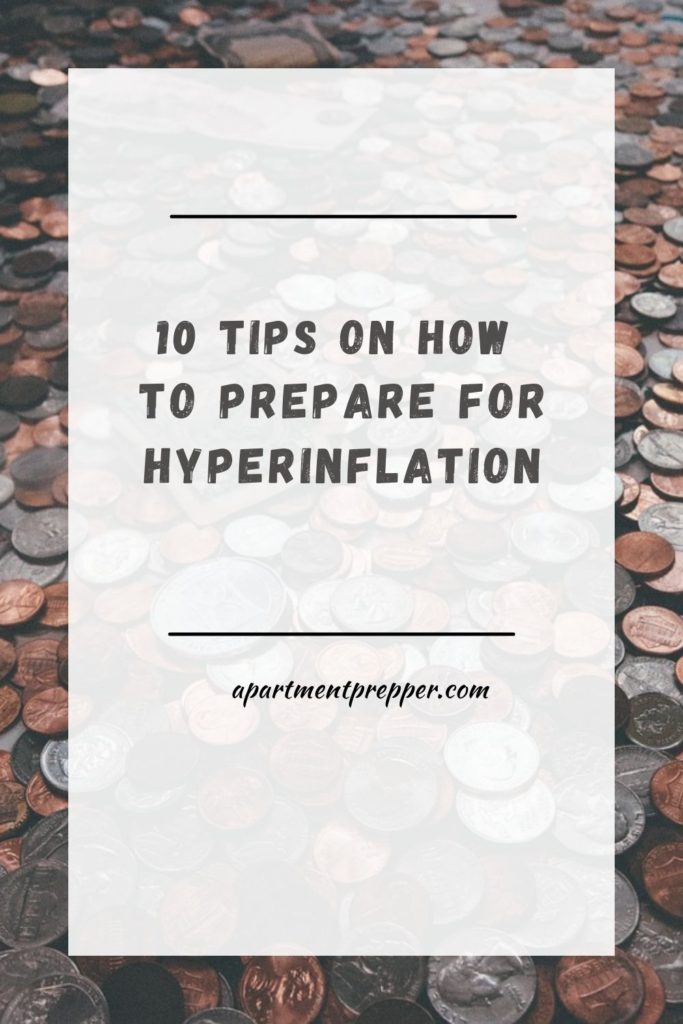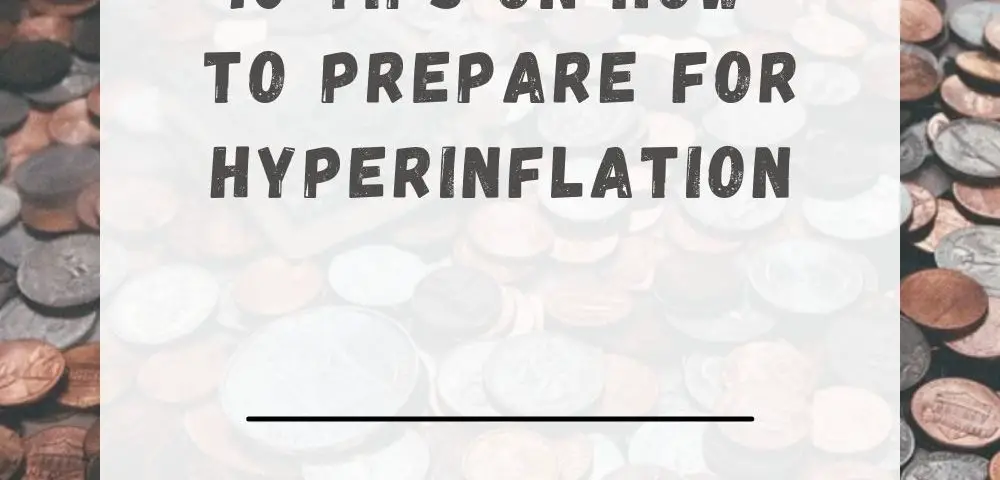Written by Bernie Carr
We’ve been seeing higher prices these past couple of months. So it’s no surprise to hear that the key inflation gauge has risen to it’s highest level in 40 years:
The Commerce Department reported on Dec. 23 that the headline Personal Consumption Expenditures (PCE) price index rose by 5.7 percent in the 12 months through November. That’s a higher pace of inflation than the 5.1 percent logged in October, which was the highest since 1990, and nearly three times higher than the Fed’s inflation target of 2 percent. It’s also the highest level since July 1982, when PCE inflation hit 5.8 percent.
SOURCE: Chron.com
This is a worrisome sign. We are experiencing inflation now, but hyperinflation is much worse. That is when price increases for goods and basic necessities such as food and fuel occur so rapidly, they become un-affordable for the majority of the population. Cash and savings lose their value, as money loses much of its purchasing power. Hyperinflation has happened in many countries throughout history, such as Germany in the 1920s; and in more recent times in Zimbabwe and Venezuela. There is no way to predict if or when this happens, or how long it lasts. I’m not a financial expert, but I have been doing some research on possible ways to prepare.
Decrease expenses
Consider ways to decrease all your expenses. Now is a good time to evaluate your bills and areas where you consistently spend money. Can you cut out services and subscriptions you no longer use? If gasoline prices skyrocket, can you bike to work? I’m not saying you should do this, just start considering where you can cut back and what alternatives you might have.
Pay off debt
If interest rates increase, unsecured debt such as credit cards will be subject to rate increases. Find ways to pay off your debts before interest rates are raised.
Cook food at home
Are you accustomed to eating out frequently? Now is a good time to cut back on restaurant or take-out meals. I always believed that cooking is a survival skill. If you don’t cook at all, take small steps to learn, even if it’s using box mixes or marinated meats from the butcher section, it’s still cheaper than eating out.
DIY
Learn to do some of your regular tasks yourself. If you are accustomed to sending clothing repairs to the dry cleaner’s tailor, try watch a YouTube video on hemming or fixing tears. You may be surprised on how easy it is to do it yourself. Try a new skill every month – herb gardening, food dehydrating, changing the oil in your car. Skills are valuable when the economy is precarious.
I noticed my neighbor recently placed a drying rack on their patio. It doesn’t hurt to have backup methods you can use in case your clothes washer or dryer stops working. This saves money on utilities too.
Start a small garden in your backyard, if you have one, or a container garden on your patio. Learning to grow edible plants is a valuable skill. Even growing a few herbs indoors will help you save money. Or try your hand at planting a dwarf fruit tree.
Refinance or reschedule future purchases
If you are in the market for high ticket items that may require financing, consider doing it before interest rate hikes. Or if you own your home, check on refinancing options from an adjustable to fixed rate mortgage. I’m not a financial expert, so consult your accountant or financial advisor for what’s right for you.
Alternative investments
Another thing to consider are possible alternative investments. Real estate, gold, silver, and other precious metals are considered as potential hedges against inflation. Here’s my story on what it was like visiting a gold dealer.
Build your stockpile
I’ve covered this advice before – keep building that stockpile of water, food and supplies while you are able to. The prices will only keep rising later. Pay attention to expiration dates and have a system to rotate your stock. “First in, first out.” I always write the expiration on top of each can I purchase so I don’t let them get old. Packaged food do last past their dates, but I don’t like them to get years old as they can get bad after a while.
Supplement your income
Try to find new ways to supplement your income, whether it’s by having a part-time job after hours, or starting a micro-business. Sell items you no longer use and make some extra cash.
Consider buying used instead of new
I used to be averse to buying anything that wasn’t new. But my mother-in-law showed me you can find quality items at inexpensive prices at thrift stores if you know how to sift through the merchandise. I have found some great kitchenware, clothes and other items, some with the original price tag, at Goodwill, Salvation Army and other second hand stores.
Security
Don’t take security for granted. As times get tougher, and basic needs are not met, people become more desperate. Crime increases as law enforcement coverage dwindles. View your home in an objective manner and think like a thief, looking at possible weak points.
In closing…
This is only a starting point of ideas on how to prepare for hyper-inflation. I’m not saying it’s going to happen, but as with all types of disasters, it does not hurt to be prepared. There is no need to panic or lose hope – stay positive and just do what you can.
If you found this article interesting or helpful, please consider helping us out (without costing you anything)! We are an affiliate of Amazon.com, which means we received a small commission if you click through one of our Amazon links when you shop, at totally no cost to you. This helps keep the lights on at the blog. Thanks!
Bernie Carr is the founder of Apartment Prepper. She has written several books including the best-selling Prepper’s Pocket Guide, Jake and Miller’s Big Adventure, The Penny-Pinching Prepper and How to Prepare for Most Emergencies on a $50 a Month Budget. Bernie’s latest e-book, FRUGAL DIY has just been released on Amazon. Her work appears in sites such as the Allstate Blog and Clark.com, as well as print magazines such as Backwoods Survival Guide and Prepper Survival Guide. She has been featured in national publications such as Fox Business and Popular Mechanics. Learn more about Bernie here.

Image by Olya Adamovich from Pixabay


Hi Bernie,
While getting out of debt is a good idea in normal times, during hyperinflation things are different.
Under hyperinflation, debt becomes worth less and less very quickly. Prices skyrocket so eventually a dollar becomes so worthless that a cup of coffee costs a million dollars.
That also means that a million dollar debt can be paid off for the cost of a coffee. Yes, the bank will have increased the interest rates to astronomical levels, but interest never keeps up with hyperinflation, so maybe its several coffees, but it is still much easier to pay off than it is now.
It is possible that most people who have a mortgage will end up owning their home free of debt after hyperinflation. If you are in a lot of debt, hyperinflation is a wonderful solution. USG is in a lot of debt.
Hi Deltaeus, Interesting effect on debt – thanks for the comment!
Nice article! More people need to think along these lines. As regards security, I worked in Toronto a few years ago and that city has many high-rise apartment buildings. We had close friends in a high-rise. And they informed us that burglaries and break-ins were virtually unknown on the 5th floor and above. Apparently the bad guys don’t think they have enough time to get downstairs and make a getaway if they go higher than that. Just something to think about or ask about if you’re looking to rent in a high-rise………..
Hi Ron, That is a very good point. Higher floors are generally safer as far as avoiding break-ins. The lower floors are still vulnerable as some burglars will use tree limbs or even other balconies to gain entry. The only thing I’d worry about is getting attacked in the elevator which is now happening in major cities, but that’s a whole other risk. I appreciate the comment!
Great points! We’ve already been dipping into our food reserves to help offset inflation. It’s a good thing we stored stuff we like instead of just ramen! LOL
Hi Joseph, I’m with you there, the food reserves bought at cheaper prices a while back really help. Thanks for the comment.